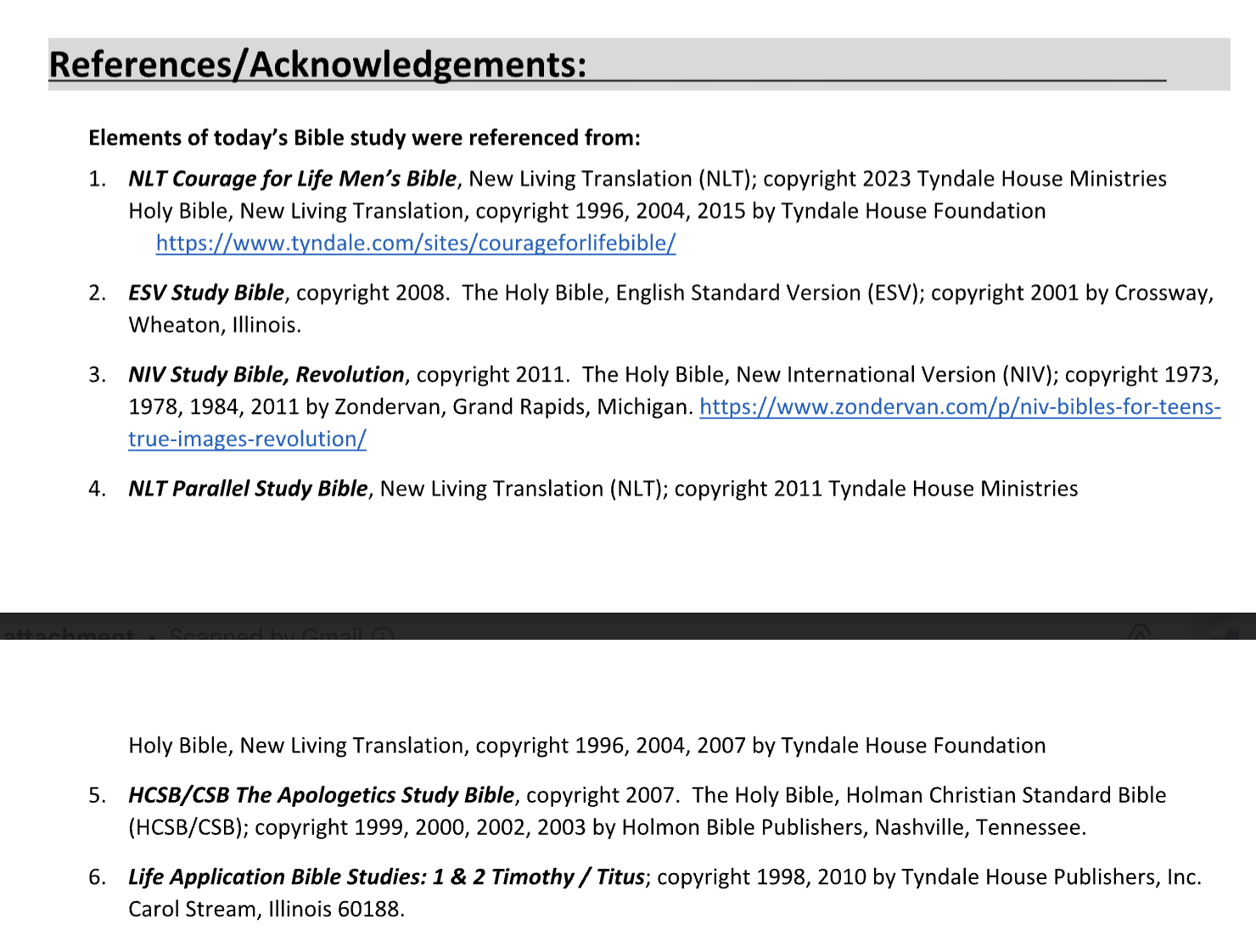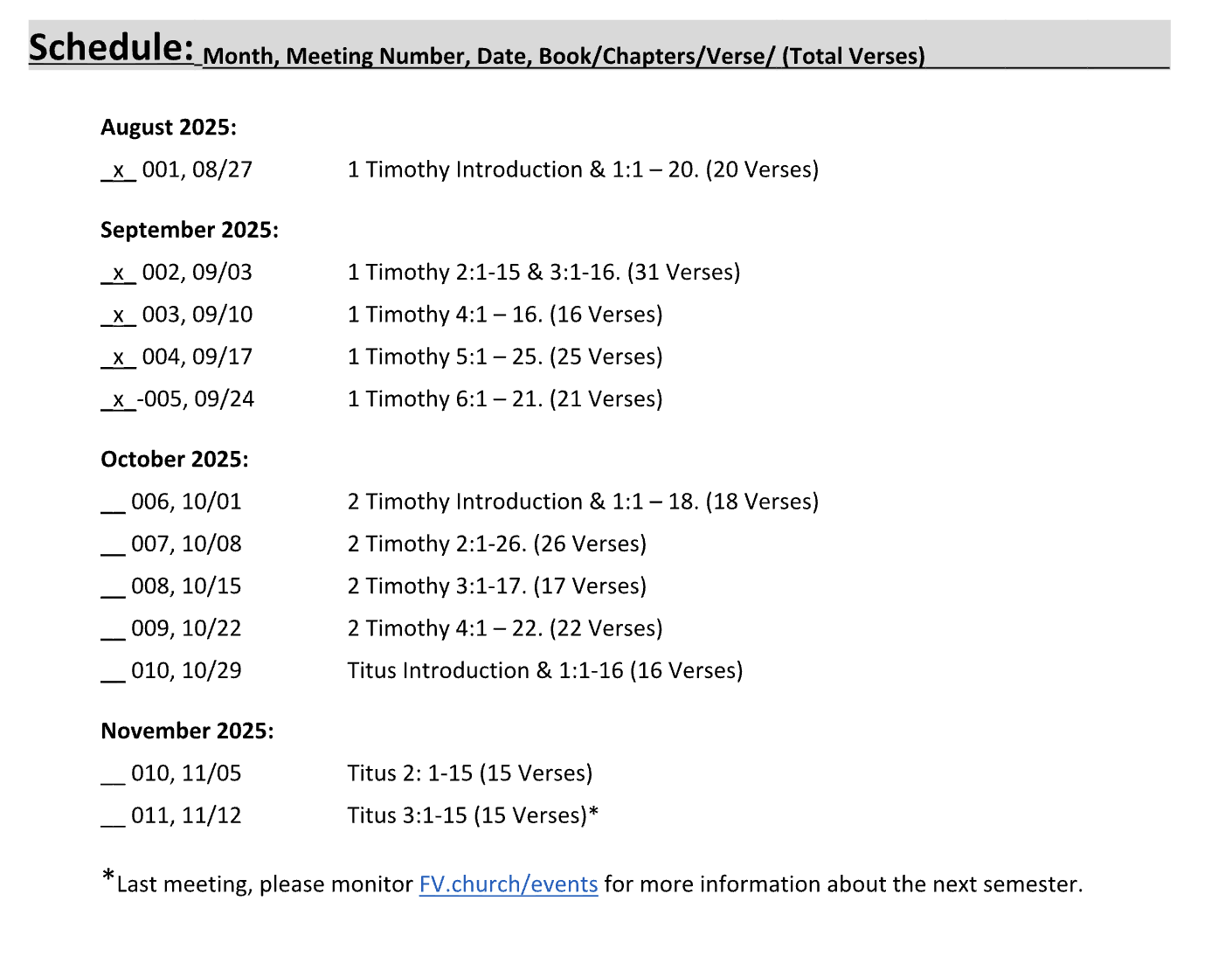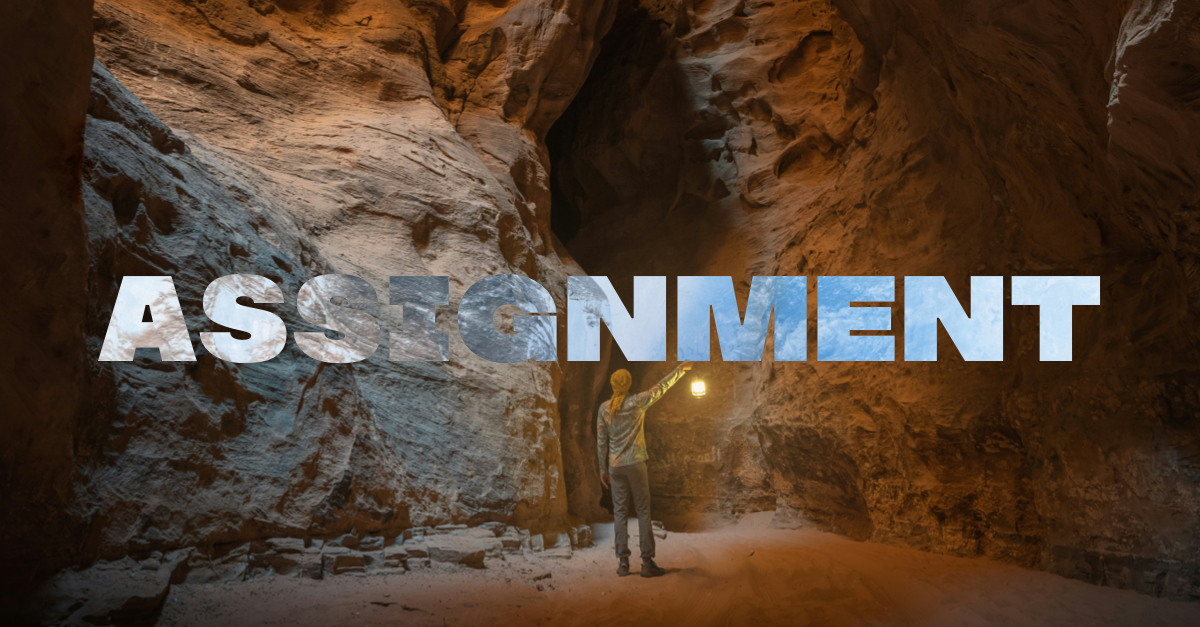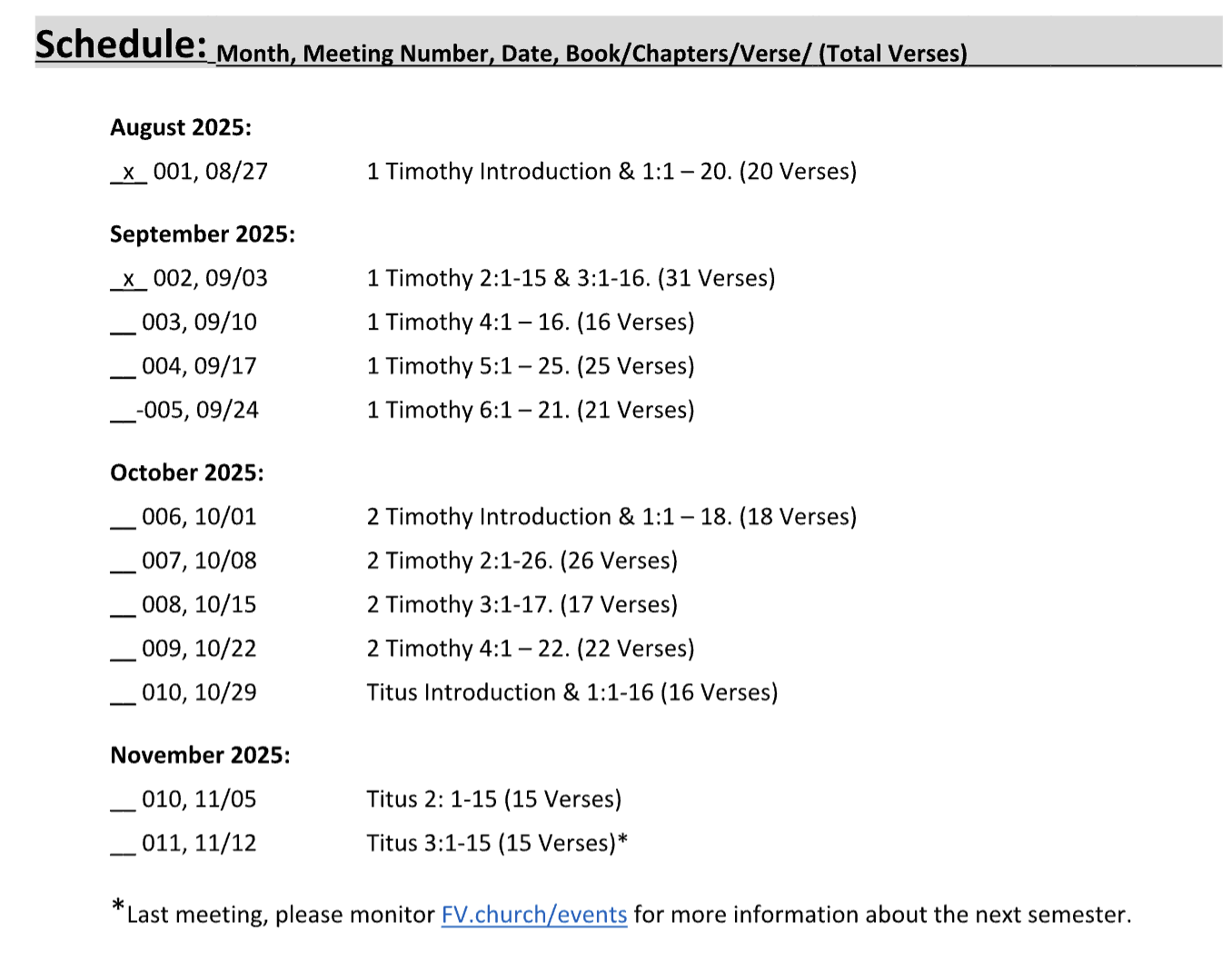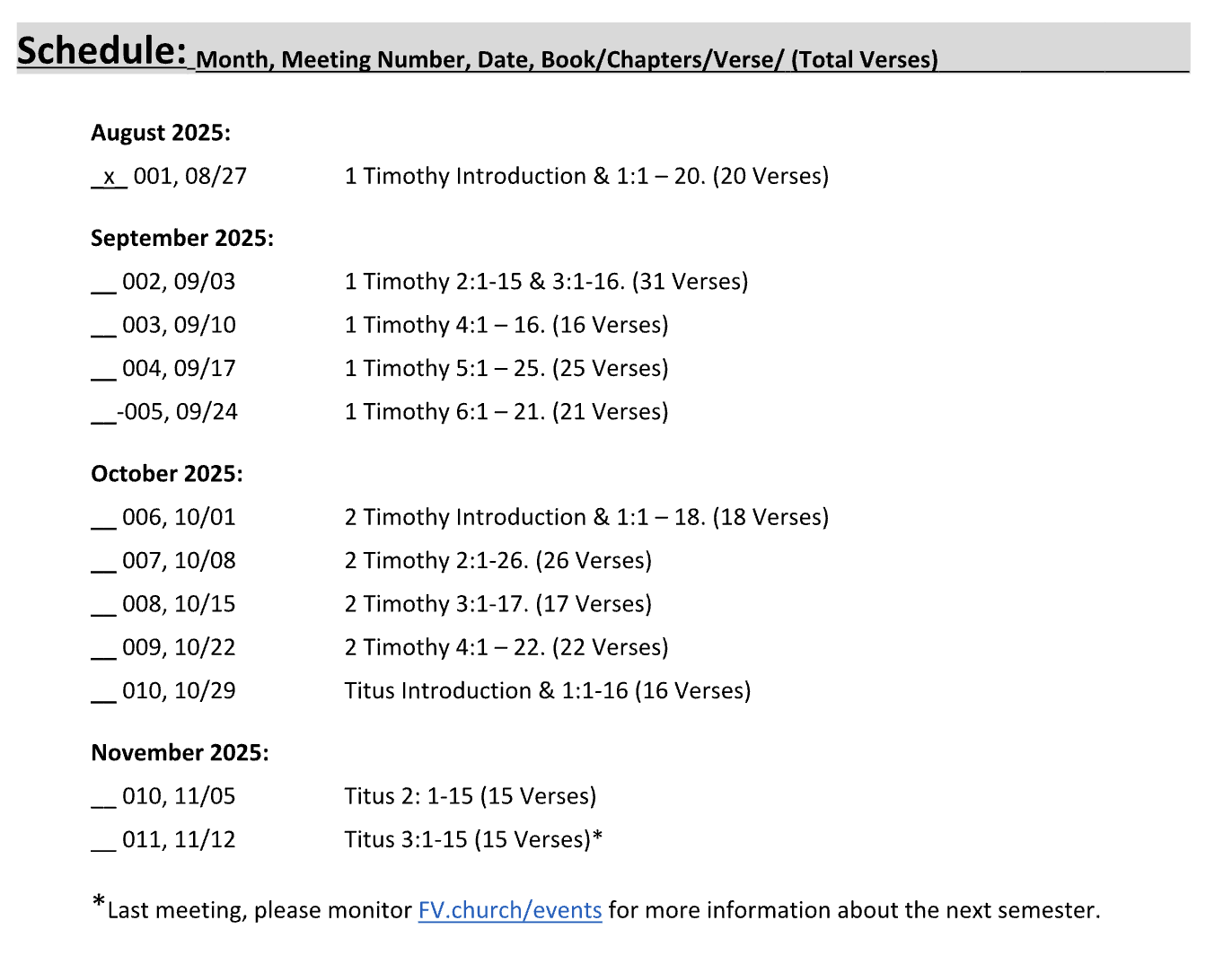Weekly Wednesdays: CALLED Men’s Group | Wednesday, October 08, 2025
Meeting# 7 of 12 | This Week’s Leader: David Goodno
INTRODUCTION: Welcome everyone, this is the seventh meeting of the Called Men’s Growth Group Fall 2025 semester. Reminder: we will meet every Wednesday through November 12, 2025; 7:00 pm – 8:30 pm.
Tonight, we are continuing a SOAP study* of Second Timothy. (*SOAP study: Scripture, Observation, Application, Prayer and Questions). – Later on in the semester we will also study Titus.
There is no specific prerequisites or formal “membership” required to attend. Please keep in mind that we are all in different places of our faith journey; we all come from various backgrounds, have different points of view and it does not matter where you are in your faith journey – 10 seconds, 10-years, or a lifetime; everyone is welcome; everyone has value; everyone has a voice. The purpose of tonight is to come together, read and study God’s word, develop an understanding, grow in our faith and have a friendly discussion.
If there are differing points of view, we should not feel attacked or be hostile to one another; it is our different points of view that add to the discussion. We came together tonight as friends and brothers in Christ. And we should leave the same (as friends and brothers in Christ). Often there is no right or wrong answer; just interpretation of scripture and even Biblical scholars don’t always agree; ultimately, JESUS IS THE ANSWER.
BACKGROUND: History of the letters: (2 Timothy)
Paul is the author of the letters to Timothy; Biblical scholars date the second letter to around 66 or 67 AD.
When Paul wrote this letter, he was virtually alone in prison, only Luke was with him. Biblical scholars believe that the letter was to pass the torch onto Timothy and the next generation of church leaders. Paul instructed Timothy to preserve the Christian faith, remain disciplined; oppose false teaching, and to minister faithfully; leading by example.
Today we can use the letters to Timothy to strengthen our own faith and spiritual discipline.
Key Themes of Second Timothy:
Boldness – In the face of opposition and persecution, Timothy was to carry out the ministry without fear or shame. Paul urged Timothy to use his gifts of preaching and teaching that the Holy Spirt had given him. The Holy Spirt helps us be wise and strong.
Faithfulness – Christ was faithful to all of us by his sacrifice on the cross. Paul was a faithful minister even when he was in prison. Paul urged Timothy to maintain not only sound doctrine but loyalty, diligence and endurance. We can count on opposition, both physical and spiritual as we service Christ. But our faithfulness through any opposition shows our perseverance, dedication and loyalty to Christ. As we grow in our trust in Christ, He will give us the courage and strength to endure and remain steadfast in our relationship with Jesus.
Preaching and Teaching – Paul and Timothy were active in preaching and teaching the Good News about Jesus Christ. Paul encouraged Timothy to teach others; passing on sound doctrine and enthusiasm for Christ. We must prepare to teach others. Some of us may not feel that we are not capable, or that we are not in a position to lead someone else. We all have someone in our circle of influence, but if you are new in your faith and unsure how to minister to others: learn about the three circles- https://www.youtube.com/watch?v=lcj5G_4dwrI , continue to attend FV-Church, come to Men’s Group, and find a spiritual mentor who can guide you.
PRAYER: This Week’s Prayer: Father God, we thank you for allowing us to come together tonight and study your word. Father, you have called us to share your message of forgiveness and salvation with others. Give us the courage and confidence to lead others to surrender their lives to You. In Jesus name – Amen
Scripture - Read: 2 Timothy Chapter 2
Observation, Application & Questions: (Identify/Discuss Among the Group)
Key verses for discussion:
Why do you think 2 Timothy Chapter 2 is used to teach the discipleship process? Think about whom you can disciple. If you are willing, share with the group.
How can we learn to endure suffering?
How are soldiers, athletes and farmers similar? Why do we think Paul used these examples?
What can we do to avoid useless arguments?
Are you good at teaching others gently? Do you have any examples that you can share? / If you are willing, share with the group.
What can we do to be gentile in our teaching others?
Like we said last week, you can tell that this letter from Paul has a much more somber, sad tone. Paul was in prison and Paul knew that he would soon die. Unlike Paul’s first imprisonment in Rome, when he was in a house where he could continue to teach. This time Paul was confined to a cold dungeon awaiting his death. At this time Emperor Nero had begun his major persecution of Christians; which he blamed Christians for The Great Fire of Rome. The persecution spread across the Roman Empire and included public torture and murder of Christians.
(Chapter 2, verses 1-13) -
What is grace? - Discuss among the group. https://www.gotquestions.org/definition-of-grace.html
Grace is related to God’s love, and mercy. Grace can be defined as “God’s favor toward the unworthy” or “God’s compassion on the undeserving.” In His grace, God is willing to forgive us and bless us abundantly, in spite of the fact that we don’t deserve to be treated so well or dealt with so generously.
Timothy preached and taught that he would undergo suffering, but that he would be able to endure.
Paul used comparisons with soldiers, athletes and farmers who must discipline themselves and be willing to sacrifice themselves to achieve the results they want. Soldiers must discipline themselves, obey orders, sometimes carry out things they don’t want to do (guard duty, cleaning, maintenance etc.). Athletes must train hard, follow strict diets, practice continually; even mundane repetitious actions. Farmers generally wake up early before dawn, work outside in the heat, work outside in the cold, and work outside in the rain. Despite the negative aspects of these careers, the vision of winning or harvest, we see that the effort, suffering, and labor was worthwhile. – we too as Christians must put forth effort, suffer, make sacrifices of our own time, wants and desires; but when we see the harvest of unbelievers brought to Christ; we can see that our endurance through it all was worthwhile.
Read: Ephesians 2:1-10
Galatians 5:16-26-
Acts 11:19-30
(Chapter 2, verses 14-26) -
Paul urged Timothy to remind believers not to argue over unimportant details. False teachers love to cause confusion and division; especially over unimportant details. We should not allow ourselves to get distracted by frivolous disagreements and unimportant details; which is why it is important to remain in The Word; so, we know what is True.
Running away is sometimes considered cowardly; but removing oneself from a situation or temptation can be the most courageous thing to do.
Paul’s advice to Timothy was to be kind and gentle when explaining the truth. To teach out of love and respect; not forcefulness.
Read: Matthew 18:1-10
1 Corinthians 13:1-13
Other questions to explore:
What was the context? What was going on at the time this was written?
What and where is this happening?
What makes what was happening meaningful?
Is there anything special about the location (or locations)?
Who is involved?
How do they respond to God?
What character traits do you notice about them?
What is the significance of their involvement?
What do you think is the key message?
Did anything that surprised or stood out to you? What was it? Share with the group and discuss.
Are there any key verses that stand out to you? Discuss among the group.
Were there any repetitive words or themes that stood out to you? What were they?
---
Is there anything that left you with more questions? What were they? Share with group, discuss, and research.
Biggest takeaway?
Assignment:
Prepare for next week’s meeting. Read: 2 Timothy 3:1-17. Is there anything that stands out when reading these verses? Be ready to discuss it at the next meeting.
Think of things that you can do to encourage new believers over the next seven days.
References/Acknowledgements:
Elements of today’s Bible study were referenced from:
1. NLT Courage for Life Men’s Bible, New Living Translation (NLT); copyright 2023 Tyndale House Ministries Holy Bible, New Living Translation, copyright 1996, 2004, 2015 by Tyndale House Foundation https://www.tyndale.com/sites/courageforlifebible/
2. ESV Study Bible, copyright 2008. The Holy Bible, English Standard Version (ESV); copyright 2001 by Crossway, Wheaton, Illinois.
3. NIV Study Bible, Revolution, copyright 2011. The Holy Bible, New International Version (NIV); copyright 1973, 1978, 1984, 2011 by Zondervan, Grand Rapids, Michigan. https://www.zondervan.com/p/niv-bibles-for-teens- true-images-revolution/
4. NLT Parallel Study Bible, New Living Translation (NLT); copyright 2011 Tyndale House Ministries Holy Bible, New Living Translation, copyright 1996, 2004, 2007 by Tyndale House Foundation
5. HCSB/CSB The Apologetics Study Bible, copyright 2007. The Holy Bible, Holman Christian Standard Bible (HCSB/CSB); copyright 1999, 2000, 2002, 2003 by Holmon Bible Publishers, Nashville, Tennessee.
6. Life Application Bible Studies: 1 & 2 Timothy / Titus; copyright 1998, 2010 by Tyndale House Publishers, Inc. Carol Stream, Illinois 60188.
Schedule: Month, Meeting Number, Date, Book/Chapters/Verse/ (Total Verses)
August 2025:
_x_ 001, 08/27 1 Timothy Introduction & 1:1 – 20. (20 Verses)
September 2025:
_x_ 002, 09/03 1 Timothy 2:1-15 & 3:1-16. (31 Verses)
_x_ 003, 09/10 1 Timothy 4:1 – 16. (16 Verses)
_x_ 004, 09/17 1 Timothy 5:1 – 25. (25 Verses)
_x_ 005, 09/24 1 Timothy 6:1 – 21. (21 Verses)
October 2025:
_x_ 006, 10/01 2 Timothy Introduction & 1:1 – 18. (18 Verses)
_x_ 007, 10/08 2 Timothy 2:1-26. (26 Verses)
__ 008, 10/15 2 Timothy 3:1-17. (17 Verses)
__ 009, 10/22 2 Timothy 4:1 – 22. (22 Verses)
__ 010, 10/29 Titus Introduction & 1:1-16 (16 Verses)
November 2025:
__ 010, 11/05 Titus 2: 1-15 (15 Verses)
__ 011, 11/12 Titus 3:1-15 (15 Verses)*
*Last meeting, please monitor FV.church/events for more information about the next semester.







